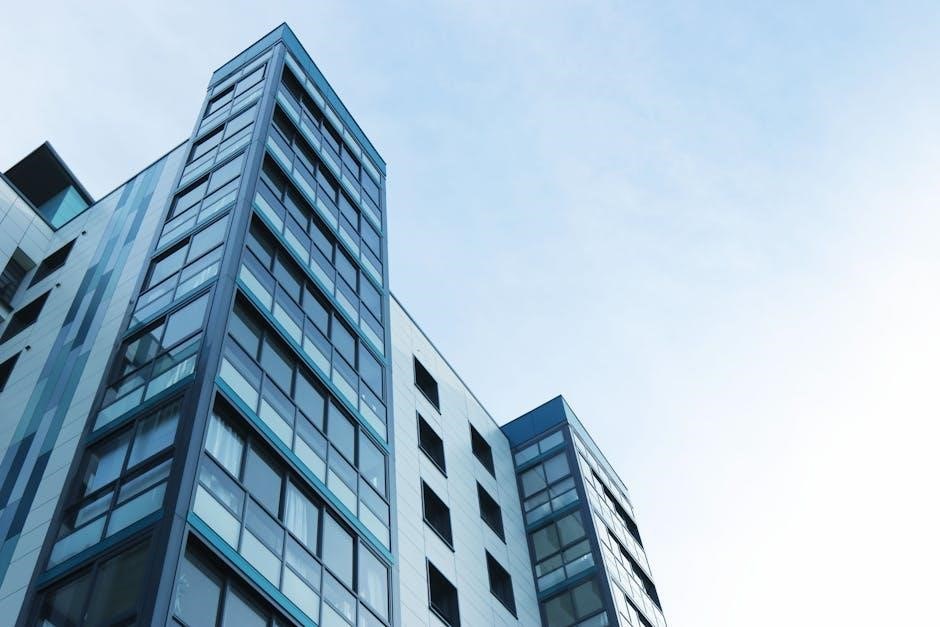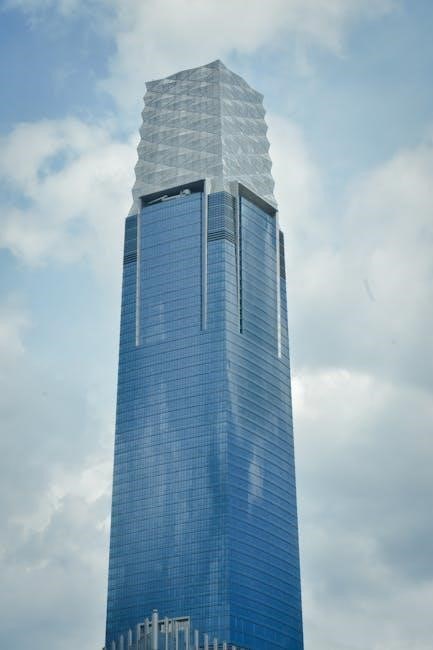The Building and Construction Award is a legal document governing pay rates, allowances, and classifications for employees in Australia’s on-site construction industry․ It is managed by the Fair Work Commission and outlines specific conditions for employers and workers, ensuring fair wages and safe working standards․ Recent updates in 2023 reflect a 5․7% wage increase, aligning with industry needs and economic conditions․

Role of the Fair Work Commission
The Fair Work Commission oversees the Building and Construction Award, ensuring compliance with workplace laws and regulating employment conditions․ It reviews wage rates annually to maintain fairness and equity in the industry․
2․1․ Role and Responsibilities
The Fair Work Commission plays a pivotal role in regulating the Building and Construction Award, ensuring it aligns with national workplace laws․ Its primary responsibilities include setting and reviewing pay rates, resolving disputes, and ensuring compliance with workplace standards․ The Commission also updates the award to reflect industry changes, economic conditions, and workforce needs․ It oversees classifications, allowances, and working conditions to maintain fairness and equity for both employers and employees․ The Fair Work Commission’s decisions are binding, providing a framework for sustainable and productive employment practices in the construction sector․
2․2․ 2023 Minimum Wage Review
The 2023 Minimum Wage Review by the Fair Work Commission resulted in a significant 5․7% increase in wages under the Building and Construction Award․ This adjustment, effective from 1 July 2023, aimed to address rising living costs and maintain wage parity across the industry․ The review considered economic data, industry submissions, and workforce needs to determine the increase․ Employers were required to implement the new rates, ensuring employees received updated pay packets․ This change reflected the Commission’s commitment to fair compensation, aligning with contemporary economic conditions while safeguarding the sustainability of the construction sector․
2․3․ Impact on the Construction Industry
The 2023 Minimum Wage Review significantly influenced the construction industry by introducing a 5․7% wage increase under the Building and Construction Award․ This adjustment, effective from 1 July 2023, raised labor costs for employers, potentially impacting project budgets and timelines․ However, it also boosted worker morale and retention, as employees benefited from higher earnings․ The increase aligned with economic conditions and industry needs, ensuring fair compensation․ While some contractors faced challenges absorbing the additional expenses, others saw it as an opportunity to improve workforce satisfaction and productivity․ Overall, the wage adjustment underscored the Fair Work Commission’s commitment to balancing employer and employee interests in the construction sector․

Pay Rates and Allowances
The Building and Construction Award outlines detailed pay rates and allowances for employees in the construction industry․ As of 1 July 2023, a 5․7% wage increase was implemented, reflecting economic conditions and industry requirements․ This adjustment applies to all classifications under the award, ensuring fair compensation for workers․ Allowances are also provided for specific conditions, such as site allowances, tool allowances, and travel allowances, which are paid in addition to base wages․ Apprentices receive pay rates proportional to their experience and qualifications, with incremental increases as they progress․ Employers are required to adhere to these rates to maintain compliance with the award․ The Fair Work Commission regularly updates these rates to reflect contemporary workplace standards and economic factors, ensuring transparency and equity for all parties involved․
Coverage and Classifications
The Building and Construction Award covers employers and employees in the on-site building, engineering, and civil construction industries across Australia․ It applies to workers engaged in construction activities, including residential, commercial, and infrastructure projects․ The award specifies classifications for employees based on their roles, skills, and responsibilities, ensuring fair treatment and appropriate remuneration․ Classifications range from laborers to tradespeople, supervisors, and engineers․ This structure helps employers determine the correct pay rates and conditions for their workforce․ The award also includes provisions for apprentices, recognizing their role in the industry and their need for structured training and development․ By defining clear classifications, the award maintains order and fairness in the construction sector, ensuring all workers are compensated according to their contributions and qualifications․
Historical Changes and Updates
The Building and Construction Award has undergone significant changes over the years to reflect industry needs and economic conditions․ Recent updates include the 2023 wage review, which introduced a 5․7% increase in pay rates, ensuring fair compensation for workers․ The Fair Work Commission regularly reviews and updates the award to maintain relevance and equity․ Historical changes have also included adjustments to classifications, allowances, and working conditions to align with modern workforce requirements․ For instance, variations to the award in 2024 focused on clarifying provisions and ensuring compliance with current workplace standards․ These updates demonstrate the award’s adaptability to evolving industry practices and its commitment to supporting both employers and employees in the construction sector․

Digital Transformation in the Industry
Digital transformation is revolutionizing the construction sector through emerging technologies like BIM, IoT, and automation, enhancing productivity and innovation while ensuring compliance with modern workplace standards․
6․1․ Emerging Technologies
Digital transformation in the construction industry is driven by emerging technologies such as Building Information Modelling (BIM), Internet of Things (IoT), and artificial intelligence (AI)․ These tools enhance project management, improve accuracy, and reduce costs․ BIM enables real-time collaboration and precise design visualization, while IoT devices optimize site monitoring and equipment efficiency․ AI algorithms predict potential delays and safety risks, fostering proactive decision-making․ Additionally, 3D printing and augmented reality (AR) are revolutionizing construction processes, allowing for rapid prototyping and immersive site inspections․ These technologies not only streamline workflows but also align with modern workplace standards, ensuring compliance with regulations like the Building and Construction Award․ By embracing these innovations, the industry is poised to achieve greater productivity and sustainability in the digital age․
6․2․ Case Studies
Recent case studies highlight how digital transformation and compliance with the Building and Construction Award have enhanced project outcomes․ For instance, Berkeley Group and Mace utilized emerging technologies to streamline workflows, resulting in improved efficiency and adherence to industry standards․ Another notable example is McT Design and Construction, which implemented advanced tools to deliver the award-winning Lennox Residence project․ These examples demonstrate how integrating technologies like BIM and IoT aligns with award requirements, ensuring fair labor practices and modern workplace standards․ Such case studies serve as benchmarks for the industry, showcasing the benefits of innovation and compliance in achieving exceptional results․
Compliance and Legal Considerations
Compliance with the Building and Construction Award is crucial for employers to avoid legal penalties and ensure fair labor practices․ The award mandates specific pay rates, allowances, and working conditions, which must be strictly adhered to․ Employers are required to maintain accurate records of wages, hours, and leave arrangements for audit purposes․ Failure to comply can result in legal action, fines, and reputational damage․ Regular updates to the award, such as the 2023 wage increase, must be implemented promptly to avoid non-compliance․ Legal considerations also include understanding classifications, apprenticeships, and dispute resolution processes․ Employers should consult the Fair Work Commission or legal experts to ensure they meet all obligations under the award․ Compliance not only protects employers but also upholds the rights of employees in the construction industry․

Industry Recognition and Awards
The construction industry is celebrated through various awards that recognize excellence, innovation, and outstanding projects․ Companies like Berkeley Group and Mace have secured titles such as Major Contractor of the Year and Project of the Year at the 2023 Building Awards․ These awards honor contributions to the sector, showcasing exceptional design, construction, and project management․ Additionally, the Build America Awards highlight impressive construction projects, while organizations like Construction Risk Partners support these initiatives․ Such recognitions inspire companies to embrace best practices and innovation․ Awards also provide a platform to acknowledge individuals and firms that set high standards in the industry, fostering a culture of excellence and continuous improvement in building and construction․ These accolades play a key role in driving industry growth and innovation․
Future Trends and Developments
The building and construction industry is poised for significant transformation, driven by emerging technologies and evolving workforce demands․ Digital solutions, such as advanced project management software and AI-driven tools, are expected to enhance efficiency and precision․ Sustainability will remain a focal point, with a growing emphasis on green building practices and energy-efficient materials․ The industry may also see shifts in labor dynamics, with a greater focus on upskilling workers to adapt to new technologies․ Regulatory changes, including potential updates to the Building and Construction Award, will play a crucial role in shaping future practices․ Employers and employees alike will need to stay informed about these developments to remain competitive and compliant in a rapidly changing landscape․ Adaptability and innovation will be key to navigating the future of this dynamic sector․
The Building and Construction Award serves as a cornerstone for fair employment practices in Australia’s construction industry․ It ensures equitable pay rates, clear classifications, and safe working conditions, fostering a balanced relationship between employers and employees․ Regular updates, such as the 2023 wage increase, reflect the Fair Work Commission’s commitment to adapting to economic and industry needs․ As the sector evolves, the award will continue to play a vital role in maintaining compliance and promoting excellence․ Stakeholders are encouraged to stay informed about changes and utilize resources like the award summary PDF to navigate the complexities of the industry effectively․ By adhering to this framework, the construction sector can sustain growth and uphold its reputation for quality and fairness․
